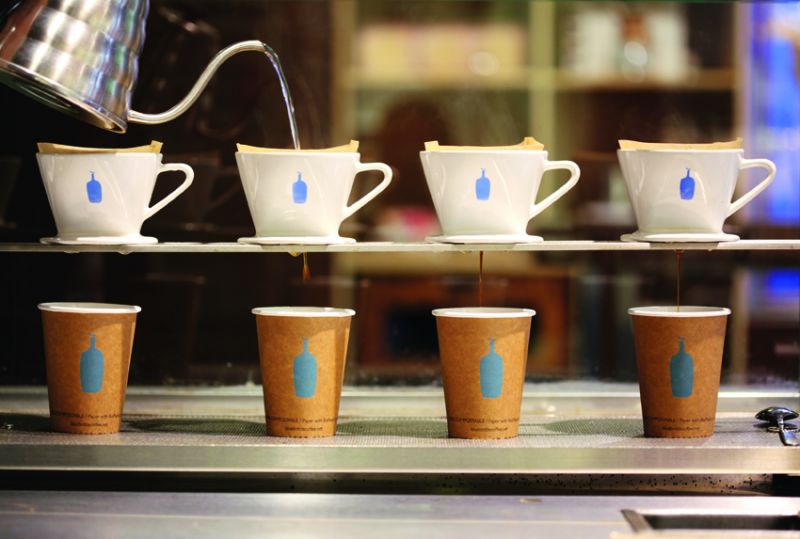The most important thing about Italian coffee beans is fresh, fresh roasting and fresh grinding.

For professional baristas, please follow the coffee workshop (Wechat official account cafe_style)
The most important thing for Italian coffee beans is freshness. Beans of the same quality will have different tastes in different periods. Single bean hand flushing has more requirements for coffee bean quality, baking degree, water temperature and barista gestures. Find some cafes where you bake your own beans in your own city, find your own taste, and then order the freshest coffee beans.
Because what we are talking about here is limited to espresso beans, and the blending of espresso beans, including roasting, is not as simple as most people think. So the really good espresso beans should only be Italian coffee processing companies with at least 50 years of traditional experience. That is, a coffee company that worked in the Italian coffee market for many years before Italian coffee was brought to the world by Starbucks Coffee. Whether it is an Italian coffee company with a history of only more than 20 years (a few may be an exception), and coffee enterprises in other European and American countries (even if they have a long history, they came into contact with espresso for nearly 20 years) and do not have the technology and ability to process espresso beans. For example, Little Red Riding Hood is an Austrian coffee company. First of all, they do not master the technology of making espresso, that is to say, after they make a batch of samples of espresso beans, if he makes bad espresso himself, how does he understand his own espresso? there is no way to know whether the espresso he processed is good or bad. The same is true of domestic coffee companies, and domestic coffee companies have limited raw bean resources, and a few people can really run all over the world and go to all coffee producing areas to learn about the characteristics of raw beans. It's just a show in one or two places. Secondly, how many domestic coffee roasters can really be regarded as processing plants with food processing hygiene standards and national health and quarantine procedures? Very little. Most of them are private family workshops, and no one knows what he adds to the coffee beans. Because no one checks their production process and process. Not to mention the technique of blending coffee. They have no idea about the production of espresso, and even if he occasionally makes good beans, he will probably be "eliminated" and give up. Where is it possible to produce good beans here? Finally, espresso is less sensitive to the freshness of beans, so Italy (mainly established coffee companies) must import better beans than any other.
Fresh roasting begins with the direct purchase of coffee and raw beans. In theory, raw beans can be stored for a long time if you keep them properly. But the truth is. Fresh bakers pick only a small amount of beans at a time. The principle of buying as much as you bake. But what the beans experienced before they were in their own hands. I am completely out of control. So finding a good source of beans is the first step. But the good thing is. You can find those very well-known manor beans. Take a good look. Manor beans. It is not planted by ordinary farmers. Every bag of beans has an ID card. Even the beans won by the auction house.
Important Notice :
前街咖啡 FrontStreet Coffee has moved to new addredd:
FrontStreet Coffee Address: 315,Donghua East Road,GuangZhou
Tel:020 38364473
- Prev

Blue bottle coffee Blue Bottle Craft of Coffee espresso formula beans
Communication of professional baristas Please follow the loyal customers of Blue bottle Coffee in the Coffee Workshop (Wechat official account cafe_style). Many of them come for delicious and refreshing stability and consistency, and the formula beans in our shop are really up to that level. ("Blue bottle Coffee") Formula beans (blend) are coffee from different countries or producing areas.
- Next

The most important thing between Italian coffee beans and hanging ear coffee is freshly roasted freshly ground coffee powder.
Communication of professional baristas Please follow the coffee workshop (official Wechat account cafe_style). Will it smell good when we eat the melon seeds just fried out of the pot? When you buy melon seeds for a period of time, it will be a long time, will there be oily or spoiled taste? So if the melon seeds are fried to the taste of Hu, then they will be kept for a long time, even if they are sealed, then they will be very tolerant.
Related
- Guji coffee producing area of Guji, Ethiopia: Humbela, Shakiso, Wulaga
- What is the most expensive variety of Qiloso in BOP multi-variety group?
- How to store the coffee beans bought home?
- Why are Yemeni coffee beans so rare now?
- Ethiopian Sidamo all Red Fruit Sun Sun Santa Vini Coffee beans
- SOE is mostly sour? What does it mean? Is it a single bean? what's the difference between it and Italian blending?
- Is Italian coffee beans suitable for making hand-brewed coffee?
- How to choose coffee beans when making cold coffee? What kind of coffee beans are suitable for making cold coffee?
- Just entered the pit to make coffee, what kind of coffee beans should be chosen?
- Can only Japan buy real Blue Mountain Coffee? What are authentic Jamaican Blue Mountain coffee beans?

